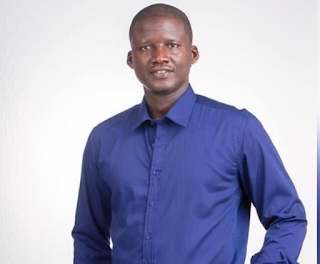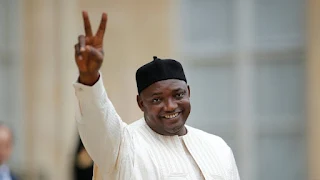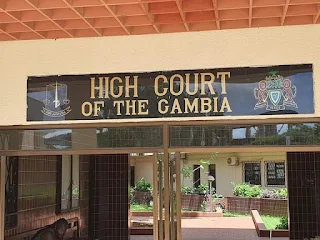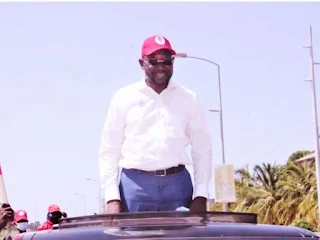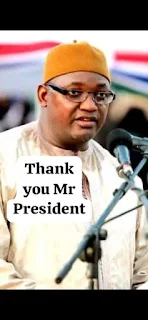Sunday, May 11, 2025
Opinion: The Forces Undermining Our Democracy
By Balang Sisay
In a recent political showdown, Mamadi Kurang faced a significant defeat at the hands of seasoned politician Hon. Halifa Sallah. Kurang, relying on his limited educational background and bravado, underestimated Sallah's decades of experience and insight, leading to a miscalculation that exposed his shortcomings.
Meanwhile, Baboucarr Keita, who gained fleeting fame from a highly publicized divorce, seems out of touch with the current sentiments of the Gambian people. Citizens have moved on from personal drama and are now dedicated to fostering a stable, progressive nation. Keita's recent actions appear driven by desperation, revealing a lack of genuine political substance and an opportunistic approach that uses public sentiment for his own gain.
A troubling trend is emerging among certain political actors, characterized by naïveté and a shallow understanding of the nation's political landscape. Their inexperience and misplaced trust make them vulnerable to being manipulated by individuals with more dangerous agendas. Perhaps they should take a lesson from figures like Killa Ace and Alieu Bah—not for their political stances, but to grasp the critical balance between activism and chaos.
After a series of public embarrassments, these individuals attempted to stage a comeback through provocative actions that undermine our democracy and the rule of law. Citizens cannot disregard established rules and expect to be rewarded.
What transpired in our country recently was not a demonstration; it was a blatant violation of our laws. We cannot afford to tolerate such lawlessness, which threatens our national stability. I recall a time when we believed anything was possible, only to see silence from those who once critiqued our actions for not adhering to due process.
While the right to peaceful assembly is enshrined in The Gambia's 1997 Constitution, it must be exercised responsibly, without infringing on the rights and safety of others. Crossing this line transforms protected expression into unlawful disruption.
This constitutional right is not only legal; it is also moral and cultural. However, we must not conflate disorder with freedom.
Since taking office, President Adama Barrow has made significant strides in enlarging democratic space, displaying resilience in the face of harsh criticism toward his government and family. Observing recent processions across the Greater Banjul Area reveals a contrast: small factions reveling in unauthorized protests while the broader population remains committed to lawful governance.
Some distant critics, motivated by personal grievances against the Barrow administration regarding past injustices, are using figures like Mayor Rohey Lowe for their own agendas, despite her lack of awareness of their political backgrounds. Our collective memory serves as a reminder of the past.
President Barrow is emerging as a steady figure during this tumultuous time, calmly guiding the nation while upholding the rule of law. The international community is observing closely, and we seem poised to overcome yet another hurdle in our journey toward democracy. Bravo, President Barrow!
Listening to influential voices like Papa Njie Girigara provides renewed hope for our national unity. I join Pa Njie in urging the Barrow government to review the situation of those recently detained and allow history to render its judgment. I remain optimistic that such measures will be taken.
May Allah protect us from discord and mischief.
Ba Lang!
"Exposed: Baboucarr Bob Keita’s Web of Lies and Dark Allegations Unraveled by GRA Chief"
It has been established beyond all reasonable doubt that Baboucarr Bob Keita is not merely a habitual liar but also a menace to society, with serious allegations of sexual assault hanging over him. His recent claims of a threatening phone call from President Adama Barrow two years ago are nothing more than a vivid fabrication—an utter manifestation of his delusional thinking, as unequivocally demonstrated by Mr. Yankuba Darboe, the Commissioner General of the Gambia Revenue Authority.
In a statement addressing the Gambian public and all concerned citizens, Mr. Darboe emphatically denies Keita's distortions. He states that the so-called "heated argument" was merely a figment of Keita's imagination, crafted to garner sympathy and spread misleading narratives. Mr. Darboe, who facilitated the only genuine interaction between Keita and the President, made it clear that the self-proclaimed confrontation was nothing but a desperate attempt to manipulate public perception.
Contrary to Keita’s outlandish claims, the interaction was rooted in reconciliation, spearheaded by Mr. Darboe’s familial ties to Keita through marriage. Their prior acquaintance was nonexistent until last year, yet Keita now exploits this connection to fabricate stories. The divergence between reality and Keita's sensationalized accounts is stark; the President’s response to Mr. Keita’s apology was gracious and devoid of any threats or intimidation.
Mr. Darboe meticulously details how he facilitated the call, allowing Keita to deliver his apology in the presence of the President, who demonstrated commendable restraint and dignity by quickly forgiving him without further ado. Vile twists of truth surrounding Senegalese politics and personal slights against his family are nothing but bold-faced lies.
To the Gambian people, Baboucarr Bob Keita stands exposed not only as a purported victim but also as a manipulative individual who seeks to distract from his own criminal behavior. His constant spinning of malicious untruths not only undermines the integrity of our leadership but threatens to damage the very fabric of our society. Let it be clear: the only intimidation at play is Keita’s calculated attempt to rally support for his image while obfuscating his own dark reality.
Youth-Led Accountability protest Hijacked by Political Opportunists
By Alagi Yorro Jallow
The Opposition’s Political Calculations and Reclaiming the Mn ovement: No Place for Political Exploitation.
Alagi Yorro Jallow
Fatoumatta: In every political crisis, survival instincts take over. When youth activists took to the streets to demand full disclosure of Yahya Jammeh’s confiscated assets, sold under questionable circumstances, they ignited a movement built on transparency, justice, and accountability. But in the shadows of their courage, opportunistic politicians and diaspora figures are now hijacking their struggle for political mileage.
Instead of standing beside these brave activists, certain figures have turned the protests into photo-ops for their personal branding. Some have rushed to detention centers, capturing selfies with arrested youth, while others have hosted press conferences in luxury hotels, masquerading as architects of the movement. These attempts to steal credit from genuine grassroots activism dilute the integrity of the fight and distort the core purpose of the protests.
Fatoumatta: Beyond the superficial political showboating, a deeper, more troubling trend is emerging: strategic undermining of the youth protests.The swift release of detained protesters—without securing tangible commitments from the government—represents a lost opportunity to force genuine engagement. Instead of securing direct assurances, activists were allowed to disperse without concessions, weakening the leverage they built through civil disobedience. This moment should have been used to demand a full-scale investigation into the undervalued sale of properties and expose the network of insiders who benefited from Jammeh’s confiscated assets.
A more assertive approach is needed—one that ensures a thorough reassessment of all seized properties, leveraging the damning revelations of former Janneh Commission Secretary Alhaji Mamadi Kurang and investigative journalist Mustapha K. Darboe. Their findings, along with scrutiny of former Attorney General Baa Tambadou’s role in these transactions, must become central to the youth’s demands for full accountability.
Fatoumatta: Meanwhile, opposition figures are attempting to capitalize on the unrest, not by amplifying the youth’s cause, but by distorting it to fit their own agendas. Instead of legitimately supporting the movement, they have co-opted the protests through self-serving press releases and staged conferences, falsely positioning themselves as the architects of the revelations regarding Jammeh’s asset sales.
However, the government’s sudden compliance in releasing the full asset list suggests it is responding out of pressure, not principle. This reaction—borne out of political survival instincts—signals a potential consolidation of power, rather than genuine accountability.
Fatoumatta: This moment is too critical to be ceded to opportunists. The youth, alongside the Gambia Youth Leadership Association (GALA), must recognize that politicians—whether domestic or in the diaspora—do not truly represent their interests at the political table.
The National Youth Council must seize this moment, ensuring that demands for transparency extend beyond protest rhetoric and into structured action. By joining the Task Force, young activists can transform symbolic resistance into policy influence, preventing both government manipulation and political co-optation of their movement.
The message to all self-serving opportunists is clear: this fight belongs to the youth. It is not for political theatrics, not for career-building, not for clout-chasing. It is about justice, integrity, and the right of the people to demand truth without interference.
Fatoumatta: Enough is enough. The youth must remain in control of their struggle, keeping political opportunists at bay and ensuring this fight remains focused on lasting change—not fleeting self-promotion.
Bubscarr Bob Keita and His Associates: A Warning to Gambians
By Yaya Dampha
Coordinator NPP Diaspora
As Gambians prepare for the 2026 presidential elections, it is crucial to recognize the political posturing of individuals like Bubscarr Bob Keita and his associates. Their attempts to capture the spotlight and manipulate public sentiment reveal a troubling agenda, one that poses significant risks for our nation.
Bob Keita, once entangled in a highly publicized legal case surrounding serious allegations, may have momentarily garnered attention and misguided support. However, it is essential to understand that any popularity gained during such tumultuous times does not equate to genuine public trust or integrity. Many supporters during his trial may have been motivated by a desire to protect men from unsubstantiated accusations, yet this does not excuse or validate his actions. The reality remains that those who engage in questionable behavior do not possess the character necessary to lead our country.
The upcoming elections provide an opportunity for Gambians to reflect critically on the qualifications of those vying for political power. We must prioritize leaders who embody integrity, maturity, and a genuine commitment to serving the people. In contrast to Keita and his associates, President Adama Barrow and the NPP are focused on fostering a stable and productive environment for all Gambians. Under his leadership, we can continue to build a brighter future, grounded in trust and accountability.
It is evident that individuals with dubious backgrounds cannot be entrusted with the responsibilities of governance. The era of relying on clowns and disruptors to steer our political direction must end. The youth protests we have witnessed are a call to action, not just for political change, but for a deeper understanding of the qualities we seek in our leaders.
Let us stand firmly behind President Adama Barrow and the NPP, as they work tirelessly to protect the interests of The Gambia. Together, we can ensure that our nation is led by those who truly aspire to contribute positively to our society, rather than those who seek to capitalize on chaos and confusion. It's time to prioritize character and vision in our quest for true representation and leadership.
Friday, May 9, 2025
Editorial: Where Was The Outrage Before No
By Alagi Yorro Jallow
The Great Gambian Blindspot: Where Was the Outrage Before Now? Selective Outrage: Why Are Protesters Ignoring the 2011 Tax Evasion Inquiry Commission? Accountability Must Be Universal, Not Selective.
Alagi Yorro Jallow
Fatoumatta: Activism thrives on accountability, justice, and transparency—but what happens when activists themselves engage in selective outrage? As Gambians rally in protest demanding government disclosure of Yahya Jammeh’s asset buyers, one glaring contradiction remains: Where was this same energy when the 2011 Tax Evasion Inquiry Commission uncovered powerful elites dodging their fiscal responsibilities? Where were the protests when Justice Mama Fatima Singhateh’s commission exposed a web of financial misconduct among lawyers, corporate giants, and state figures?
Instead of mass mobilization, there was silence. Instead of calls for justice, there was indifference. And now, suddenly, the streets are filled with voices claiming to fight for transparency—but transparency for whom?
If activists and their supporters truly stand for accountability, then why have they ignored systemic corruption beyond Jammeh’s regime? This movement must confront uncomfortable truths, because justice is not real if it is selective.
Fatoumatta: As Gambians rally for accountability and transparency, demanding answers about Yahya Jammeh’s looted assets, one glaring question remains unanswered: Why is there no outrage over the damning findings of the 2011 Tax Evasion Inquiry Commission? This commission, chaired by Justice Mama Fatima Singhateh, exposed powerful and influential lawyers, business elites, and professionals who failed to pay their taxes—a direct betrayal of the nation’s economic integrity. Some even challenged their tax liabilities in the Supreme Court, attempting to evade responsibility through legal maneuvering rather than compliance.
Yet, where are today’s protesters, who claim to be fighting for justice and transparency? Their silence on this issue reveals a troubling inconsistency—one that suggests political opportunism rather than genuine activism.
If transparency is truly the goal, then activists must confront all forms of corruption—not just the ones that fit political narratives. The 2011 Tax Evasion Inquiry Commission uncovered widespread financial misconduct, yet no sustained movement emerged to demand consequences for those implicated.
Instead, many of the same voices now calling for protests against Jammeh’s asset sales were silent when elite professionals dodged taxes, depriving the state of critical revenue. This selective outrage raises serious questions:
Why was there no mass mobilization when the commission exposed tax evasion among powerful figures? Why do activists ignore systemic corruption beyond Jammeh’s regime? Are protests truly about justice, or are they being shaped by political convenience? True accountability must be consistent—not cherry-picked based on political expediency.
Fatoumatta: Activism should never be reduced to a tool for political maneuvering. Yet, many protesters today risk becoming pawns, blindly following narratives shaped by political elites rather than engaging in independent, critical advocacy.
The silence on the 2011 Tax Evasion Inquiry Commission suggests that some activists are willing to overlook corruption when it does not serve their immediate agenda. But justice is not selective—it must be pursued wherever wrongdoing exists, whether it involves former presidents, business elites, or influential lawyers. If Gambians truly want transparency, they must demand accountability across all sectors, not just where it is politically convenient.
The fight for justice and transparency must be rooted in principle, not political calculation. If protesters ignore past corruption while selectively targeting certain figures, they risk undermining the credibility of their movement.
The 2011 Tax Evasion Inquiry Commission was a critical moment in The Gambia’s history, exposing deep-rooted financial misconduct. Yet, it was met with silence. If activists truly stand for accountability, they must demand justice for all forms of corruption—not just the ones that fit political narratives. The question remains: Will Gambians fight for real transparency, or will they continue to be pawns in a selective battle?
Statement Condemning Intimidation of Investigative Journalist Mustapha K. Darboe
By Alagi Yorro Jallow
The blatant attempt by leaders of the National Human Rights Commission (NHRC) and the Media Council of The Gambia (MCG) to pressure The Republic newspaper into exonerating former Justice Minister Abubacarr Tambadou is an unacceptable assault on press freedom and investigative journalism.
Journalists do not exist to sanitize reputations or shield public figures from scrutiny—they exist to expose truth, hold power accountable, and inform the public. The April 30 investigative report, “The Assets of Gambia’s Former Dictator Go for a Song,” raised serious concerns about corruption and lack of transparency in the sale of Yahya Jammeh’s assets. Instead of addressing these concerns through lawful and transparent means, NHRC Chair Emmanuel Daniel Joof, MCG Executive Secretary Bai Emil Touray, and MCG Governing Council Chair Baboucarr Cham resorted to intimidation tactics, summoning Editor-in-Chief Mustapha K. Darboe to demand a joint statement clearing Tambadou of wrongdoing.
This brazen attempt to manipulate the narrative is not only a violation of journalistic ethics but also a dangerous precedent for press suppression. The insinuation that Darboe was paid to conduct the investigation is a baseless and defamatory attack on his credibility, designed to discredit legitimate reporting and silence independent voices.
We unequivocally condemn this intimidation and demand the following:
1. An immediate end to all forms of pressure and coercion against The Republic newspaper and its journalists.
2. A public apology from NHRC and MCG leaders for their attempt to interfere with independent journalism.
3. A reaffirmation of press freedom by all institutions tasked with upholding democratic values.
The Gambia Press Union (GPU) has rightly called out this unethical interference, warning that journalistic integrity must never be compromised to serve political interests. The proposal to “tweak the facts” is a direct attack on truth and public trust—and must be rejected outright.
Journalists must be free to investigate, report, and expose wrongdoing without fear of retaliation. The Gambian people deserve transparency, accountability, and an unwavering commitment to press freedom.
We stand in solidarity with Mustapha K. Darboe and all journalists who refuse to be silenced.
Alagi Yorro Jallow
Former Executive Member of the Gambia and Emeritus Journalist.
Thursday, May 8, 2025
Editorial: GALA Misguided in Their Approach
The newly established activist group, Gambians Against Loathed Assets (GALA), appears to be misinformed about the legal framework governing protests in The Gambia. Rather than effectively advocating for change, their tactics of public demonstrations echo sentiments from a time when free expression was met with harsh repression. Just a few years ago, many Gambians lived in fear of dissent under a dictatorship where any attempt to protest could lead to dire consequences, including imprisonment or, in some cases, even death.
Today, however, Gambians can apply for permits to hold public demonstrations without fear of government retaliation. This shift illustrates a significant move towards freedom and democracy in our country. Despite this progress, it is essential to recognize that the right to protest is governed by the Public Order Act, which mandates obtaining police clearance to hold public gatherings. This law has undergone scrutiny and has been upheld by various courts, including the Gambia Court of Appeal and the ECOWAS Court, as evidenced by notable cases involving the United Democratic Party leaders.
Regrettably, some so-called human rights activists, journalists, and political figures—who once cowered under the regime of Yahya Jammeh—are now misleading our youth. They risk jeopardizing the future of these young people by encouraging protest actions that could lead to legal troubles.
The recent actions of the National Human Rights Commission (NHRC) serve as a stark reminder of this environment. In a disturbing turn of events, the NHRC leadership pressured the publisher of a critical investigative report to publicly vouch for former Justice Minister Abubacarr Tambadou. This move raises significant questions about the integrity and independence of our institutions.
The Gambia Press Union (GPU) has condemned such pressure tactics, which undermine journalistic freedom and professionalism. The allegations against investigative reporting should be met with transparency and accountability, not coercion or intimidation. The GPU strongly asserts that the rights of journalists to provide accurate and balanced information must be preserved without external interference.
As citizens of The Gambia, it is imperative to discern the motivations behind such advocacy and to engage in a manner that respects our evolving democratic framework. TRUE progress lies in fostering dialogue and understanding within the bounds of our laws, rather than descending into chaos that endangers our hard-won freedoms. Let us not be swayed by misguided leaders but rather advocate for our rights in constructive and lawful ways.
The Public Order Act Is Still Law
By Alagi Yorro Jallow
The Public Order Act: A Law of Controversy, But Still the Law. The Danger of Misinformation in Legal Discourse. The Case of Ousainou Darboe: A Legal Precedent.
Alagi Yorro Jallow
Few laws in The Gambia’s legal framework spark as much debate and contention as the Public Order Act. While critics argue that it is anti-democratic, the reality remains: it is a legitimate and enforceable law. Those who invoke constitutional principles must do so with accuracy and integrity, avoiding misinformation or political distortion.
The Public Order Act has been tested in court, challenged at the highest judicial levels, and remains legally binding. It is not a relic of dictatorship, nor is it an arbitrary tool of suppression—it is a law that has survived judicial scrutiny, including cases brought by prominent political figures.
The Case of Ousainou Darboe: A Legal Precedent
One of the most high-profile challenges to the Public Order Act came from Lawyer Ousainou Darboe, leader of the United Democratic Party (UDP). In 2016, Darboe and the UDP executive were arrested, tried, and convicted under this law for participating in unauthorized protests. Seeking justice, Darboe appealed his conviction at multiple levels:
• The Appeal Courts
• The Supreme Court
• The ECOWAS Court
Yet, each appeal was dismissed, reinforcing the legal validity of the Public Order Act. The courts upheld the government’s authority to regulate public demonstrations, confirming that while protest is a constitutional right, it must adhere to legal procedures.
This ruling sets a precedent—one that activists and legal commentators must acknowledge when discussing the law. In an era where social media amplifies narratives, it is imperative that discussions surrounding legal matters remain fact-based and intellectually honest. The Public Order Act is often misrepresented, with commentators twisting its provisions to fit political agendas. Conduct thorough legal research—understanding court rulings and precedents. Avoid political distortion—ensuring legal arguments remain objective. Uphold integrity in discussions—promoting fact-based activism rather than misleading rhetoric.
The Public Order Act remains a valid law, upheld by The Gambia’s highest courts. While its democratic implications can be debated, its legal standing is indisputable. Those who invoke constitutional principles must do so with accuracy, ensuring that public discourse remains informed, responsible, and free from manipulation.
Justice is not served through misinformation—it is upheld through fact-based legal challenges. If activists wish to contest the Public Order Act, they must do so through judicial processes, not through distorted narratives.The law is not perfect, but it is the law—and until it is successfully challenged, it remains binding.
Tuesday, May 6, 2025
GAF Warns Essa Faal And Samsudeen Sarr ToCease Misleading Statements
The Gambia Armed Forces (GAF) has issued a press release cautioning former Army Commander Samsudeen Sarr and aspiring presidential candidate Essa Mbaye Faal against making misleading public statements that misuse the name of the Armed Forces for political gain.
GAF expressed serious concern about a trend of unfounded commentary surrounding its operations within the democratic framework of The Gambia. The military institution highlighted specific remarks from Sarr, who referenced an isolated incident involving the Senegalese Gendarmerie and questioned the presence of GAF soldiers at key security installations. Such narratives, according to GAF, misrepresent the professionalism and non-partisan nature of the military.
Faal, in a recent interview, alleged government neglect of the GAF, claims that GAF describes as unfounded and potentially harmful. Such assertions politicize the Armed Forces, eroding public confidence in an institution committed to reform and accountable under democratic civilian authority.
The GAF High Command condemned these unethical comments, which they believe detract from national cohesion and could compromise security. They reiterated their commitment to professional standards and operational integrity in alignment with the Security Sector Reform agenda.
In its statement, GAF called on Sarr and other public figures to refrain from disparaging the military. The Armed Forces also urged political parties and media outlets, including West Coast Radio, to uphold professional ethics and avoid involving the military in political discourse.
GAF reaffirmed its dedication to maintaining peace and security in The Gambia and contributing to the nation’s socio-economic development. They encouraged all Gambians to support the Armed Forces in its mission to transform into a professional and democratically accountable institution.
Signed,
Colonel Lamin K. Sanyang
Director of Press and Public Relations
Gambia Armed Forces
6 May 2025
Friday, April 25, 2025
In Defence of Lawyer Mai Ahmad Fatty
By Yaya Dampha
Mai Ahmad Fatty’s bravery and dedication to the cause of
democracy in The Gambia cannot be overstated. His willingness to confront the
oppressive regime of Yahya Jammeh, even in the face of life-threatening
dangers, exemplifies true courage. The assassination attempt where a truck was
deliberately driven into his car serves as a stark reminder of the lengths to
which dictators will go to silence dissent.
Despite these harrowing experiences, Fatty’s resilience
shone through as he not only survived but also became a pivotal figure in the
fight for democratic governance in The Gambia. By founding his own political
party and rallying support from the Gambian diaspora, he has played an
instrumental role in advocating for democracy and human rights.
Mai Ahmad Fatty deserves respect and recognition for his
contributions to the struggle for freedom in The Gambia. His story is a
testament to the power of perseverance and the importance of standing up
against tyranny. It is vital that we remember and honor his sacrifices,
ensuring that they are woven into the fabric of our nation's history as we
continue to strive for a brighter future.Mai Ahmad Fatty’s advocacy and
political engagement reflect a commitment to the progress and development of
The Gambia a commitment underscored by the tangible advancements achieved under
President Adama Barrow’s leadership. In a nation that has long suffered from
neglect and mismanagement, it is vital to recognize the critical developments
that have unfolded in recent years.
Under President Barrow, The Gambia has witnessed a
transformation in infrastructure, with road networks expanding to connect
communities that have long been isolated. Access to electricity has reached the
most remote areas, illuminating lives that were previously shrouded in darkness
and deprivation. Healthcare services have improved significantly, making
essential medical care accessible to the marginalized populations that had been
overlooked for decades. Education services have also seen reinvigoration, providing
opportunities for the youth and fostering a brighter future for our nation
Mai Ahmad Fatty’s acknowledgment of these achievements is
not merely political maneuvering; it is a testament to his dedication to the
well-being of Gambians. Recognizing the progress made under the current
administration is crucial in fostering a constructive dialogue focused on the
future. While the struggle for democracy and human rights continues, it is
equally important to celebrate the milestones that have been reached and to
encourage more development-oriented initiatives for the benefit of all citizens.
As we reflect on the journey towards a democratic and
prosperous Gambia, let us embrace a spirit of collaboration and constructive
criticism. Mai Ahmad Fatty’s endorsement of developmental progress is an
invitation to all political actors to prioritize the needs of the Gambian
people above partisan squabbling. It is a call to work together in a shared
commitment to create a society where every individual can thrive, benefiting
from the liberties won through decades of struggle.
In recognizing the positive strides made, we bolster our
collective spirit and empower ourselves to continue the fight for a better
Gambia—one that honors both our past and our aspirations for the future. Let us
support leaders like Mai Ahmad Fatty, who advocate not only for justice and
accountability but who also appreciate the importance of development in
building a stronger, more united nation.
If someone sacrificed a minute for you try to respect them for a second.
Thursday, April 24, 2025
The NPP Government's Commitment to Reform and Progress
Defending Accountability: The NPP Government's Commitment to Reform and Progress
The recent dismissal of over one thousand workers in The Gambia, identified as "ghost workers" in a thorough audit, has ignited a wave of political criticism, primarily from certain journalists and opposition figures. These individuals have rushed to politicize the issue, alleging that the NPP government is to blame for employing these non-existent workers. However, such claims overlook the significant strides the government has taken towards accountability and reform within the labor sector.
The term "ghost workers" refers to those who remain on official payrolls yet are neither present nor contributing to their organizations. This issue is not unique to The Gambia; it has been a persistent challenge in various countries worldwide, especially in developing nations where systems of monitoring and accountability may not be as robust.
Acknowledging the Reality of Unaccounted Workers
Critics tend to focus solely on the recent firings, ignoring crucial factors that have led to this situation. Many of the affected employees were engaged in roles that did not involve regular clocking in—such as field workers in agriculture or education. The lack of digital timekeeping tools in these sectors presents a challenge in tracking actual attendance, making it easier for discrepancies to arise.
The NPP government has shown a commitment to addressing these fundamental issues. By undertaking a comprehensive audit to identify ghost workers, the administration has demonstrated its dedication to transparency and efficiency. This proactive approach signifies that the government is not only interested in worker accountability but also in ensuring that public resources are utilized effectively for the benefit of the Gambian people.
Progress Amid Criticism
It is crucial to recognize that the broader issue of ghost workers is exacerbated by economic migration and systemic inefficiencies—factors that have been longstanding challenges in our society. Many young civil servants, seeking better opportunities abroad, have left their posts, resulting in discrepancies in employment records. Instead of placing the blame on the government, journalists and critics should consider the complex socio-economic landscape that contributes to these challenges.
Moreover, while some journalists paint the narrative of governmental negligence, they fail to acknowledge the progress the NPP government has made. The introduction of modern work practices and technology is vital for mitigating the risk of ghost workers. By investing in digital solutions and transparent labor management systems, the NPP is taking significant steps to reform the public sector workforce.
A Call for Constructive Engagement
It is essential for journalists and commentators to engage constructively with these developments rather than resorting to politically charged accusations. The endless cycle of blame only serves to create division rather than fostering a cooperative atmosphere that can lead to meaningful change. The NPP government is tirelessly working towards building a transparent, accountable, and efficient public service, and we—all stakeholders—should support this mission.
In conclusion, rather than focusing solely on the issue of ghost workers through a polarizing lens, we should recognize the commendable efforts made by the NPP government to enhance accountability in the workforce. Embracing a collaborative approach to address these concerns can lead to a more effective governance model that ultimately benefits all Gambians. It is time to champion constructive dialogue and support the government's initiatives for a better, more accountable future.
Saturday, April 19, 2025
Fugitive Wandy Simaga Convicted for Firearm Possession Following Airport Escape
Wandy Simaga Found Guilty After Dramatic Escape and Subsequent Arrest
The Gambia Police Force has confirmed the conviction of Wandy Simaga, a fugitive who escaped from custody at Banjul International Airport on September 28, 2024. Simaga had been on the run until his capture on April 13, 2025, following an extensive manhunt.
Upon arriving in The Gambia aboard a Vueling Airline flight, Simaga was intercepted by security personnel and found in possession of two pistols, eight pepper sprays, and thirteen mobile phones, all suspected to be contraband. During a high-risk screening conducted by various law enforcement agencies, he managed to evade capture and escape the scene.
Following his recapture, Simaga was arraigned before Her Worship Anna O. Mendy, Principal Magistrate at the Brikama Magistrates’ Court. He faced two serious charges:
1. Importation of prohibited firearms, in violation of Section 6 of the Arms and Ammunition Act (Cap 20:01)
2. Possession of firearms without authority, contrary to Section 8 of the same Act.
In court, the charges were read and explained to Simaga in Mandinka, to which he pleaded guilty. He accepted the facts presented without objection.
As a result, he was convicted and sentenced as follows:
- Count One: a fine of D100,000 or two years’ imprisonment
- Count Two: a fine of D100,000 or two years’ imprisonment
The sentences are set to run consecutively, meaning Simaga faces a total of four years in prison if he is unable to pay the fines. Additionally, the court ordered the forfeiture of the two pistols—designated as Exhibits A and B—to the state, following the prosecution's request in accordance with Section 25(3) of the Arms and Ammunition Act.
The Gambia Police Force praised the successful resolution of the case, reaffirming its commitment to pursuing fugitives, upholding justice, and safeguarding national security.
Friday, April 18, 2025
Reflecting on Yahya Jammeh's Complicated Legacy
By alhagie Suntou Touray
Truth, Compassion, and the Path to National Healing: Reflecting on Yahya Jammeh's Complicated Legacy
Yahya Jammeh’s legacy is far from one-dimensional, a fact that demands careful consideration. While many Gambians benefited from his policies—including scholarships, financial assistance, and initiatives like the Presidential Award for Young Entrepreneurs and Professionals (PaJEP)—it is equally important to confront the darker aspects of his rule.
As a former president, Jammeh was, like all humans, capable of making mistakes. However, the mistakes made during his presidency were not trivial. They were profound and, regrettably, resulted in the loss of lives, freedom, and dignity for numerous Gambians.
For those who still support and admire Jammeh, the most honorable response is not to perpetuate blind loyalty but to acknowledge his missteps with sincerity. The teachings of the Noble Prophet Muhammad (peace be upon him) remind us that when significant wrongs are committed, the righteous path is one of Tawba—repentance. This process involves seeking forgiveness both from God and from those who have been harmed, marking the beginning of emotional accountability and representing an act of strength rather than weakness.
What is particularly alarming is the reluctance among some to acknowledge the consequences of Jammeh’s actions, opting instead to defend the indefensible. This stance reflects a troubling lack of compassion and diminishes the suffering experienced by countless victims and their families.
The Gambian people are inherently forgiving, and for some, supporting Jammeh may offer personal solace. However, it must never come at the expense of truth. Such support should not diminish the pain endured by others or invalidate the experiences of those who suffered under his regime.
Speaking from personal experience, in December 2007, I was detained at the Navy Headquarters. I was fortunate to be released unharmed, thanks to the intervention of a naval officer on duty. Had he not been present, I could easily have become another name among the many Gambians who faced brutal torture or disappearance. That moment, rather than leaving me bitter, serves as a testament to the precariousness of survival for so many.
It is crucial to recognize that, while Jammeh’s administration had its benefits—like facilitating access to civil service jobs for previously marginalized groups and sponsoring spiritual pilgrimages for many supporters—these contributions do not erase the serious human rights violations that also marked his time in power. It is only human to feel gratitude for the positive aspects of his governance. Yet, it is equally essential to express empathy for those who bear the scars of his regime.
We must create space for dual truths: that some Gambians thrived under Jammeh's leadership while others suffered irreparably. A healthy society is one that can hold these truths together, allowing for a rich and nuanced understanding of our past.
I think of my late friend, Ebrima Solo Sandeng—may Allah grant him eternal peace. He epitomized principles of compassion and humanity, and to his family, as well as to the families of all victims of past injustices, I extend my deepest prayers: may Allah grant them Jannah and peace.
The journey toward national healing begins with acknowledgment. It is only through confronting our past with honesty and compassion that we can work toward reconciliation, justice, and unity.
Subscribe to:
Comments (Atom)
